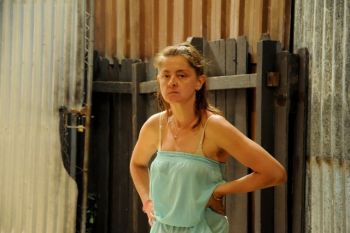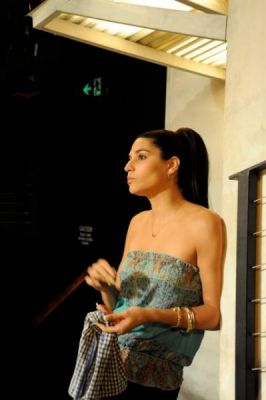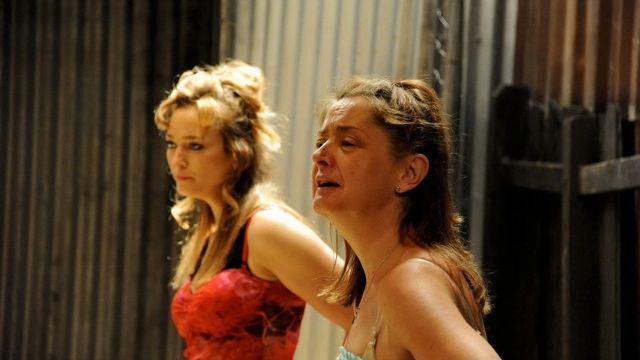The Boys: The Women and The Playwright.
Griffin Theatre Company has revived Gordon Graham’s the play The Boys, 21 years on from its premiere production at Sydney’s Stables Theatre. The playwright, and the four actors who play the women in the play spoke to Neil Litchfield.
I began my conversation with Gordon Graham by asking what led him to write a play based on the brutal rape and murder of Anita Cobby.
Gordon Graham: It’s very fictionalized, but it was a response to my own horror and the general horror. Day after day you had these horrible stories coming out, with people just gripped by the awfulness of it, and thinking how could this happen. Where could this come from?
I’d written some bleak characters before, and considered the idea of a single character who somehow got to that level of things, but what steps would have to follow for the idea of that sort of a group thing developing. It seemed to be the way to answer this question of how people could get from Point A to Point B in the space of a day or so, starting off already on the edge, ready to explode, ready to do things, but what combination of circumstances that particular day got them to that point. It was my attempt to imagine it after that with my own very fictionalized characters.
And then particularly the women – what it would be like for the women who were attached to them. I really didn’t know anything about them, except for the mother of one of them, who got some coverage. I had no idea whether they had girlfriends or attachments, so I totally made that up. I just tried to imagine how different people would feel over months as that unfolded.
 Neil: Your first mention of these characters is as the women, in a play called The Boys.
Neil: Your first mention of these characters is as the women, in a play called The Boys.
Gordon: I would talk about the men. In the play they are called The Boys, and they are very much the boys together. They have a level of emotional maturity that is, in some ways, stages down from the women. I suppose there are some people who never get beyond some stage they got to, somewhere late in high school, if they finished it – the kids who were down the back of the classroom, or would hang out in the playground jeering and smoking, and never quite get past that.
Neil: So you’ve created the characters of the four women who love these men, but who also have to deal with the consequences of their actions?
Gordon: That’s really what it was about, and that’s the hardest thing to get right. The play copped some criticism at its initial airing at the Playwrights Conference. It had supporters, but some people were quite angry against it. I suppose for some people I didn’t get the balance right, whereas for others I did. It’s how you can have characters who are sympathetic to men who would do something like that, without saying, ‘Oh well, they encouraged them.’
It’s like women who are repeatedly bashed by the same man, and people say why doesn’t she just leave him. These attachments are like that. You can’t explain it on some rational level. I think the fact that they resist believing the worst about these men for a long time is true to life.
It doesn’t mean therefore that I’m either saying that these women encourage it, or that women bring these things on by accepting behavior like that.
 Neil: We tend to assume that the play is set in Sydney’s Western Suburbs, but it’s not purely about that area is it?
Neil: We tend to assume that the play is set in Sydney’s Western Suburbs, but it’s not purely about that area is it?
Gordon: No. I grew up in the outer suburbs of Perth, and left there in my early twenties. A lot of the background is drawn from my early life in Perth. I don’t even mention Sydney, I think, though it’s assumed it’s there because of the Anita Cobby connection. It’s a generalized suburb. You could equally find a place in Melbourne where it might be set.
It’s a place where there’s a fair bit of deprivation. They’re on the outskirts, on the edge, in the middle of nowhere, where there’s nothing much to do. All they can do really is hang about. A sense of deprivation, or us and them builds up; that people out there look down on us.
After the media call for The Boys, where I saw a couple of scenes from the production, I had the opportunity of speaking to the actors who play the roles of the women in the lives of The Boys, Jeanette Cronin, who plays their mother, Sandra, and Cheree Cassidy, Louisa Mignone, and Eryn Jean Norvill, who play the girlfriends.
Neil: You play the women in the lives if the young men of the play’s title, The Boys, who have perpetrated this horrendous crime.
Jeanette: One of the things about the play is unwrapping that discussion and finding that horrifying logic – people wanting this to be an extraordinary event, whereas when you unravel it, it’s not that extraordinary actually. It has a terrible logic to it, and a reason – you can join the dots as to why these things happen. The women spend a lot of time in the play trying to make sense of it for themselves.
 Neil: During the media call, the scenes I’ve seen are very early on, before the crime itself.
Neil: During the media call, the scenes I’ve seen are very early on, before the crime itself.
Jeanette: It was the first scene where Glenn arrives back from prison and is with his family again. There’s a lot of expectation on all sides and a lot of wanting everything to be all right. Everyone’s trying very hard. Another thing that’s great about that scene is that it’s a family that loves their brother who’s been in prison for a year, and they’re so happy to have him home. It’s a young man who has lost his freedom for a year, and is happy to be home, but shocked and shattered and all those things. So it does have a domesticity to it, and there’s a lot of love there, and coping, and trying to make things good.
What process did you go through in developing the role of the mother?
Jeanette: An interesting thing we’ve talked about, for all of us, is that in life people tend to play positive actions; they do try to make the best of things, they do try to fix things and gee things up. Very rarely do people go out and play negative actions on each other. Most of the time when people get hurt it’s because people are thoughtless, not because people are malicious.
These people are normal people who happen to be in these circumstances, so they have their own dignity, and their own hopes, dreams and disappointments, but they’re constantly being judged by society as not being good enough. With that then comes a reaction, and a bucking up, and perhaps a denial, then a rationalization – like they’ve done this, but how do I rationalize it. Like, they’ve done this, but surely they can’t be … they haven’t done it … they couldn’t have done it. All those kinds of things that people go through.
And the women are interesting, because there’s someone going, ‘Well I don’t know what they’ve done,’ then my character is going, ‘They couldn’t have done that. They’re my children, and my children can’t do things like that.’
Sandra’s between a rock and a hard place because it’s lose / lose for her – if she walks away she’s a bad mother, but if she stays and defends them she’s the mother of monsters in everybody else’s eyes.
Neil: And these boys have girlfriends who dote on them, yet they go out and carry out this horrendous crime against a woman, who then have to deal with the consequences
Eryn Jean Norvill: Nola is at the bottom of the pack. She’s Stevie’s girlfriend, the newcomer, she’s pregnant and she’s the youngest, so she’s not fully formed as a person, whereas a lot of the other characters know who they are. Nola is still very questioning, and she’s come from the worst background. Her life before this place was a lot worse than this new family is, so she feels so lucky to be in this situation and to have Stevie as well. It might be different for the other women in the play who have fallen in love with a particular side of the boys, but for Nola this is the best place that she’s been in her life.
 Neil: That’s sad
Neil: That’s sad
Eryn Jean: It is quite sad, but she’s quite a positive person as well, because this is possibly the best time in her life.
I think the women fall in love with a side of the boys that they see, that the boys give them just a glimpse of. When they’re together, there’s moments in the play when the boys let down their walls, especially with Sandra, when they’re given one moment to release and relax, and they don’t have to be puffed up in the way they do when they’re round the other boys – that kind of pack mentality. It’s those moments when they let down their walls, that it’s possible to fall in love with somebody.
I think the women are constantly trying to bring that side out of them again, and that’s how they can justify that belief – “Of course the boys didn’t do it, because I know there’s that side of them, and that’s just for me, and that’s why I can love them”
Jeanette: And it becomes self-perpetuating because you have the need to help somebody, and feel needed. And there’s a certain vanity in that as well, and a certain denial.
Louisa Mignone: Gordon Graham, the writer, said to me, it’s called The Boys, but really the irony of it is that it’s mainly about the women. It’s about how we deal with it and us questioning whether we’re the cause of it. It’s quite confronting.
Cheree Cassidy:Our role is coming to grips with, and dealing with, what they leave us with. We feel we’re the apex of the play, because that’s what the audience is left with – dealing with the consequences of what these boys have done in that situation on that day. And the violence that is left, and how their lives have left us – and the kind of violence they did – not just physical violence – it’s a mental violence and manipulation.
 Louisa: It’s gross!
Louisa: It’s gross!
Cheree: Yeah, it’s gross. The way they think, and the way they converse, and the politics of their conversations is so perverted.
Louisa: What I also think is really interesting is that it’s a play about the perpetrators’ family. Every film you see is about victims and victims’ families and how they deal with it. Gordon has written something looking at perpetrators and where they come from, and why this sort of stuff happens. I think it’s about responsibility too, and where does that lie and how does it spiral out of control. The play is written differently from the film. They’re kind of more ordinary boys – they’ve done some petty kind of crime. They haven’t previously really, really hurt anyone.
Cheree: They’ve come from low economic status – potentially there’s some violence from the father, which isn’t in the play
Louisa: And they do something that’s horrific
Cheree: But that’s the question – is it something that’s totally uncharacteristic of these people, or where do you bring it back to the point of reason.
Michelle, my character, is the last character to finally give in. In a way she’s kind of like the audience in a way. They come into the story knowing what it is, but the whole time they’re going - Are they going to do it? Did they do it? You don’t want to believe that they’ve gone and done it. She’s closest to the audience in that way; the last one to give in.
Neil: The Boys implies a bond between the male characters, albeit negative. What sort of bond is there between the women?
Jeanette: The women, for a large part of the play, are thrown into crisis together – it’s battle stations. Sandra has a line, ‘The only way we’ll get through this is by sticking together.” So a lot of the play is the women trying to nut out the situation, and shoring each other up, to make sure that they’re all aligned. Sandra wants to bring Jackie into the fold, because she’s the one who’s not coming to the party 100%. She’s prepared to stand by Glenn, but she’s not prepared to say they didn’t do it.
They do have a very strong bond, and they’re all isolated in society. That’s what they all have in common, and that’s kind of where they get their strength as well.
Cheree: The boys have a union from the start, because they’re the brothers. They have that family bond, but the women have all come from separate families.
Louisa: Our commonality is the boys.
 Cheree: They’re quite unique people. And they’re uniting on such an ugly situation. The interest is their individual conflict during this larger conflict, and how they come together to resolve it. They have no choice, to do that.
Cheree: They’re quite unique people. And they’re uniting on such an ugly situation. The interest is their individual conflict during this larger conflict, and how they come together to resolve it. They have no choice, to do that.
Louisa: I sit on the outside. Jackie is the one who is completely on the outside of the family. I’m the black sheep who comes in and is trying to claw her way out of that battler class, so she assumes status above them, or tries to put herself outside of it, so when the wheels do start to come off, she goes to protect Glenn of course, but she does assume the worst very quickly.
Neil: How does that work in the dynamic?
Cheree: It gets very heated. We definitely have the most conflict with each other, because of Michelle’s undying love.
Michelle: It’s the more obvious conflict. The conflict between Sandra and Michelle is a lot more complicated, because Sandra is Brett’s mother, and I’m the girlfriend living with Sandra. My loyalty is imperative to stay there – that’ not the reason for my loyalty, but it feeds it.
Neil: Do the themes extend beyond the Western Suburbs for you?
Jeanette: Crimes against women are pretty universal, as is domestic violence, and it’s always a bit of an onion that is interesting to unravel. It’s intriguing as to why people stay in the situations the stay in – it’s very complicated. I find them intriguing they’re beautifully drawn characters and very transportable – you could take them anywhere. Gordon has made these beautiful people. This sort of thing happens everywhere, those kind of behaviors and passive / aggressive relationships and violent relationships happen across society.
 All people love, all people hate, all people are disappointed, all people have hope – and really that’s what Sandra stands for – she’s just living her life. She’s not taking it – she’s standing up to the criticism in a way. She’s not playing their game.
All people love, all people hate, all people are disappointed, all people have hope – and really that’s what Sandra stands for – she’s just living her life. She’s not taking it – she’s standing up to the criticism in a way. She’s not playing their game.
Louisa: It does happen everywhere. Time wise it’s really relevant too.
I think it's the psychological violence too, of people behind closed doors, and just between two people, and also the way it evolves over time. Families and the way they communicate, and how you manipulate your family is really interesting. No-one else has that style of conversations. Twenty years into an immediate family, it’s so convoluted, it’s so complicated, and that’s in every family, but unique to its own.
And this kind of violence is everywhere. Like someone said, will it ever stop being relevant? The answer is the play will never stop being relevant unless people stop killing each other, or stop abusing each other, or stop hurting. It’s not just against women; it’s against everyone.
Griffin Theatre Company’s production of The Boys plays at the SBW Stables Theatre, Kings Cross until March 3, 2012.
Photography by Lindsay Kearney, Lightbox Photography.
To keep up with the latest news and reviews at Stage Whispers, click here to like us on Facebook, or follow us on Twitter.
Subscribe to our E-Newsletter, buy our latest print edition or find a Performing Arts book at Book Nook.

